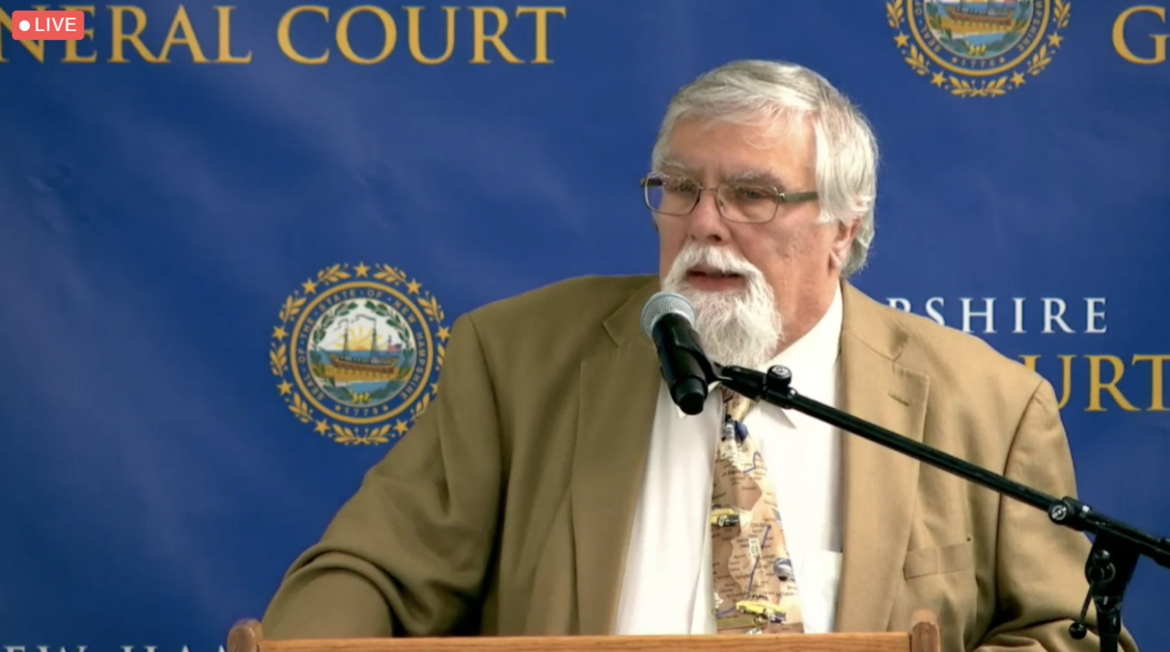By GARRY RAYNO, InDepthNH.org
CONCORD — Two state representatives who attended both Wednesday’s and Thursday’s House sessions have tested positive for COVID-19.
The House Communications office notified House members Sunday about the positive tests but did not release the information to the public or name the two members.
During Thursday’s session, Rep. Bill Marsh, D-Brookfield, a physician, raised the possibility a member had tested positive the night before taking an at-home test distributed to members. The representative attended Thursday’s session despite the test results and House Speaker Sherman Packard telling members to stay home if they do not feel well.
After Marsh raised the issue, Packard asked for evidence and said if it were true, the person should leave immediately.
In the message to members sent Sunday it said “both individuals were able to assist us in identifying their close contacts at the event. Those close contacts were notified separately by phone and/or email.”
Out of an abundance of caution, the message said, House leadership was notifying all House members.
“Please maintain a high degree of vigilance as community transmission rates continue to be high throughout the state. Please monitor yourself for symptoms, and stay home if you are sick,” the message concluded.
Before last week’s sessions, two House members who are medical professionals, raised concerns about the House sessions at the Exposition Center in the DoubleTree by Hilton in Manchester, instead of Representatives Hall, to allow for social distancing.
The center had masked and mask optional sections, with almost all Democrats wearing masks and most Republicans without masks.
“I hate being correct,” said Rep. Jeffrey Salloway, D-Lee, an epidemiologist who taught at the University of New Hampshire. He did not attend the two sessions because of the risk to his health.
He said the representatives were infectious when they attended the sessions. Salloway believes there were three House members who were infected.
If it is the Omicron virus, it has the potential of one person infecting three others.
So there is a likelihood 12 people infected now from the two sessions, and the infections will grow, Salloway said.
If 30 or more are infected, he said, undoubtedly between 15 to 20 will be sick and five to six will need hospitalization, “adding to the burden currently on our hospitals now.”
The question is did the Speaker do his due diligence, Salloway said, noting the Speaker found what he believed was a safer venue, issued a verbal warning, and said if anyone tested positive Thursday they should leave immediately.
“The question was that adequate due diligence to prevent an outbreak,” Salloway said. “We will know by Thursday or Friday if there is an outbreak.”
“It’s a razor-thin line the leadership of the House has walked,” Salloway said, “and I fear they have fallen over that line.”
After Sunday’s message, Marsh said the two House sessions violated a number of Center for Disease Control guidelines.
“It looks like the Speaker just provided the evidence he asked me for on Thursday,” Marsh said. “Also that this is exactly what we would expect if the House Session turns out to have been a super-spreader event.”
He said the sessions were held when infection levels in New Hampshire were at their highest levels, it was a large indoor event with poor ventilation, although portable air purifiers were present, it was long with a large crowd, and behaviors known to increase risk such as singing, shouting, not maintaining physical distancing, and not wearing masks. All those issues violate CDC guidance, he noted.
Before the sessions Marsh and Salloway expressed concern the sessions could turn into a super-spreader event, due to the surge in the highly contagious Omicron variant, the state’s high community transmission rates and that many Republican representatives refuse to wear masks or to be vaccinated.
The first day of the session, the Republican majority — for the fourth time — voted down a rule change Packard said is needed, to allow members to meet remotely instead of in person. The state Supreme Court issued an opinion that lawmakers could constitute a quorum meeting remotely, but Packard maintains current House rules require in-person sessions.
A number of medically at-risk Democrats, including Minority Leader Renny Cushing of Hampton, filed suit before last year’s session in federal court to allow remote participation citing the Americans with Disabilities Act.
The U.S. District Court judge sided with Packard, but that decision was overturned by the 1st Circuit Court of Appeals. A rehearing was requested by Packard, was granted and held, but a decision has yet to be released.
Garry Rayno may be reached at garry.rayno@yahoo.com





